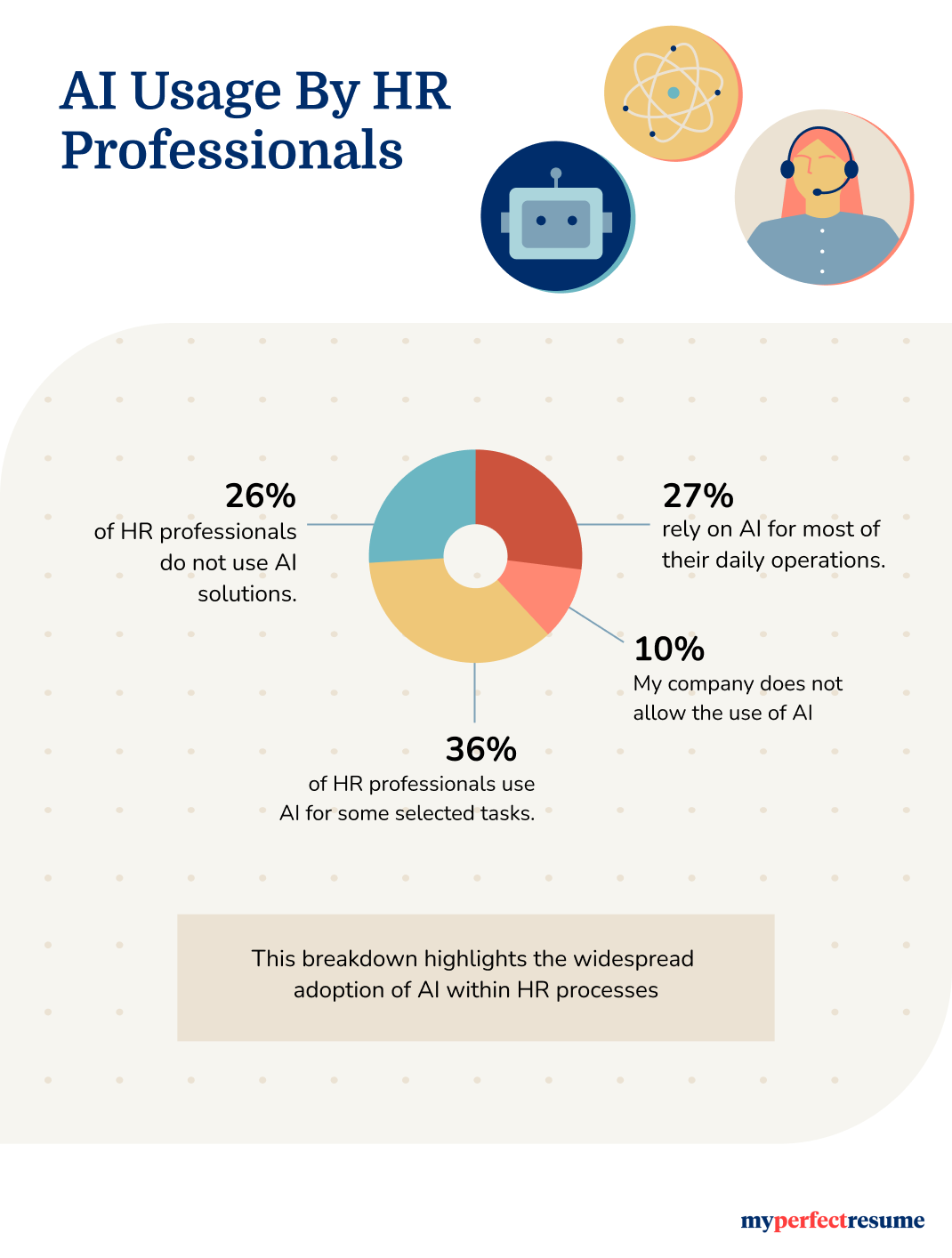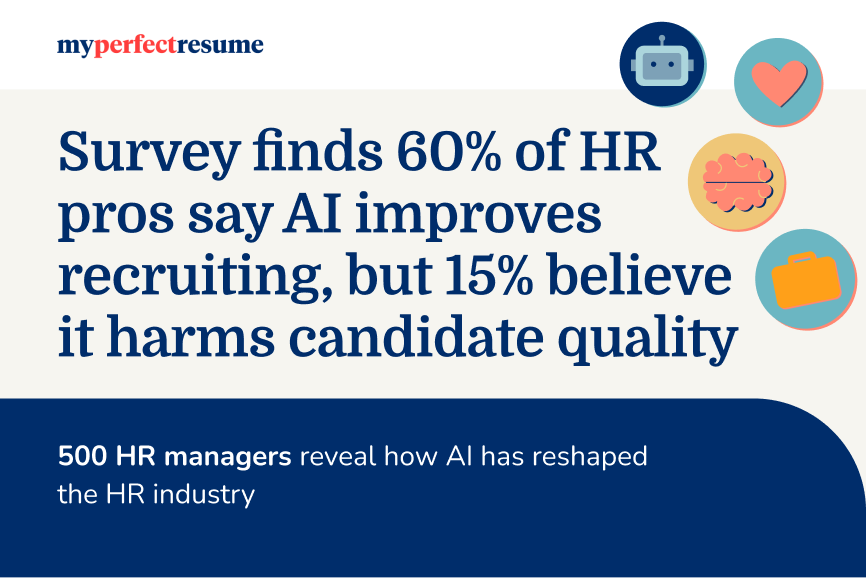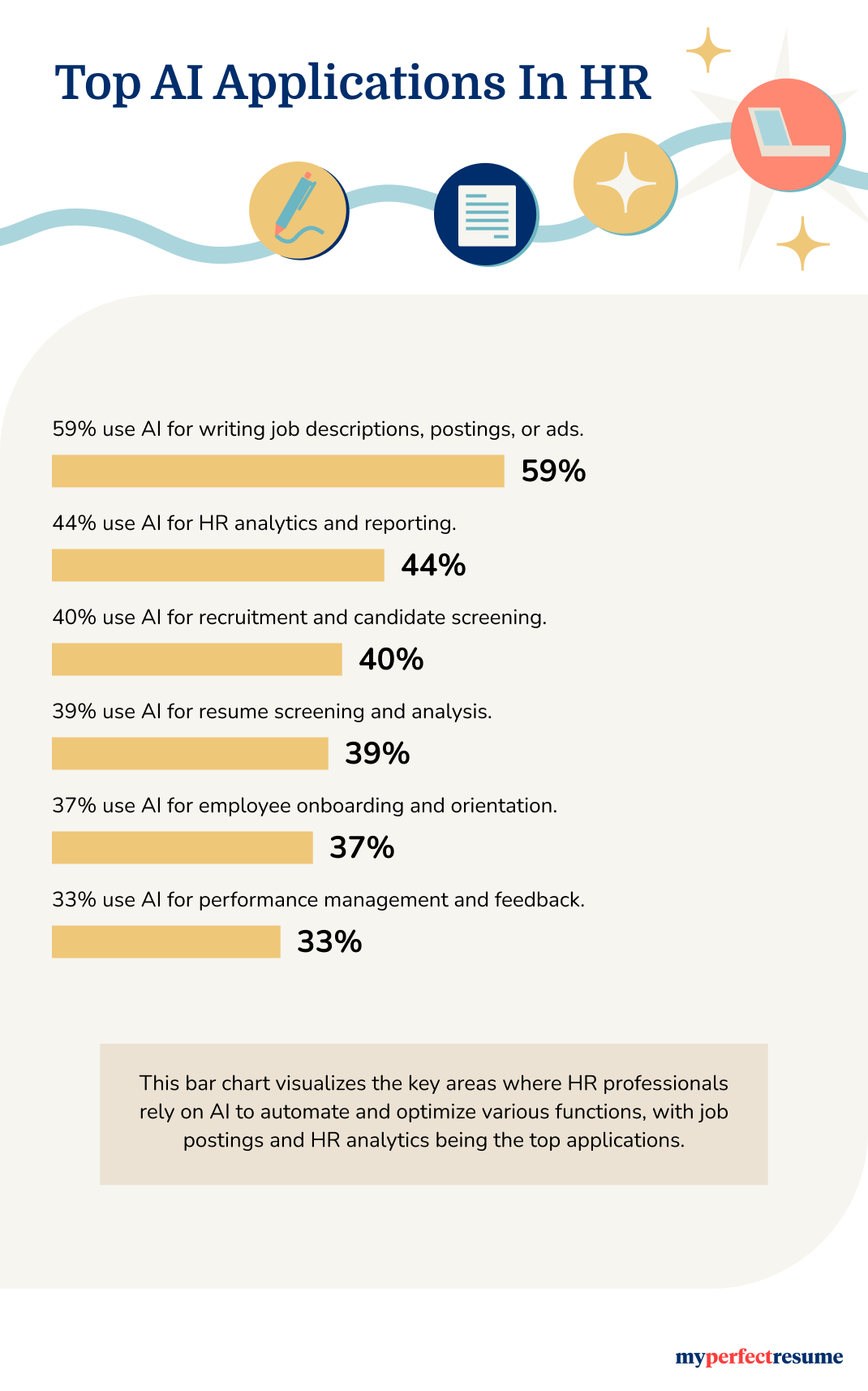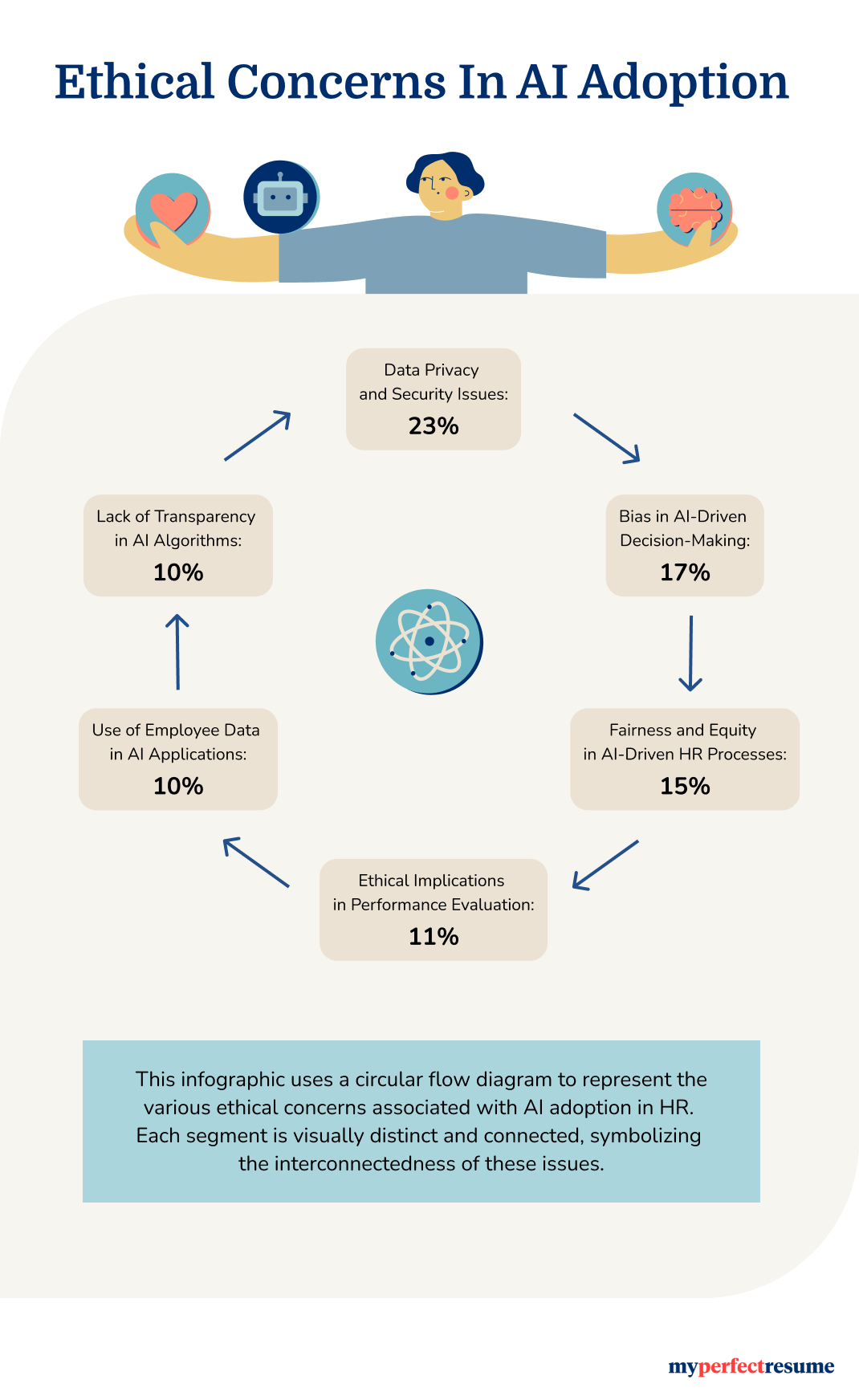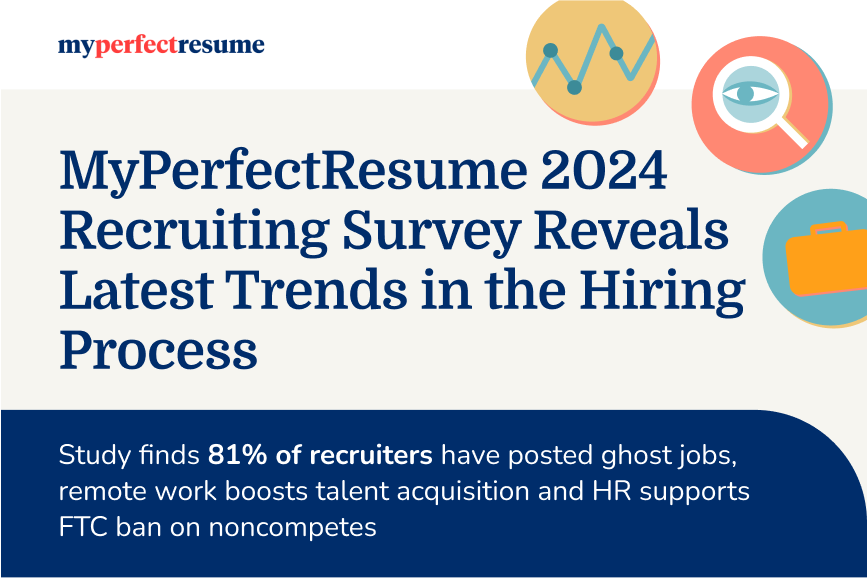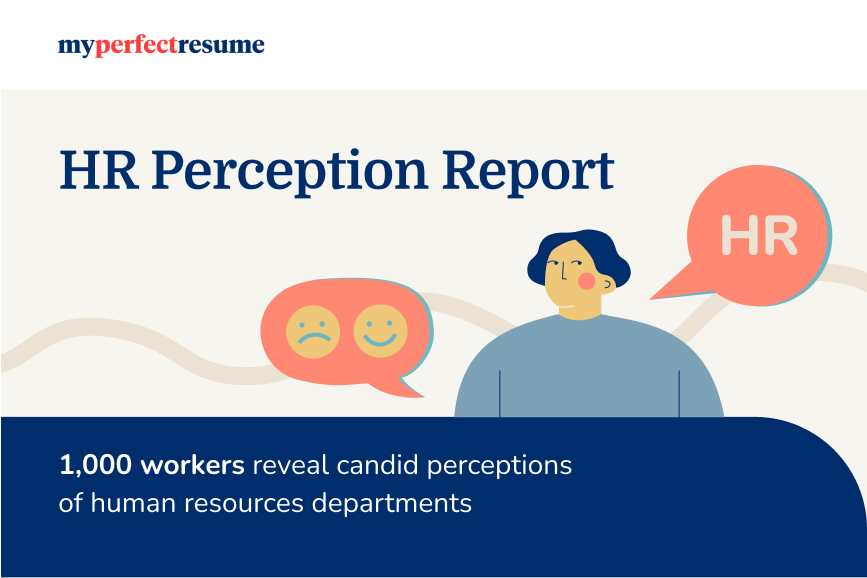AI in HR Study Finds 64% of HR Managers Embrace the Technology, but Ethical Concerns Remain
MyPerfectResume.com [October 25, 2024],
[https://www.myperfectresume.com/career-center/careers/basics/ai-in-hr]

Our customers have been hired at: *Foot Note
Table of Contents
Get started with MyPerfectResume today!
- Build a resume on any device
- Pick an ATS-friendly template
- Tailor with AI copy suggestions
Artificial Intelligence is no longer just a futuristic concept—it's now a cornerstone in many industries, including Human Resources.
AI has transformed how HR teams operate, from streamlining recruitment to enhancing candidate screening.
However, as AI adoption soars, so do concerns about ethical issues like data privacy and bias.
A recent MyPerfectResume poll asked 500 HR managers to share their thoughts on AI’s influence on HR and how technology is reshaping the field.
The survey explored the prevalence of AI, its influence on recruitment and related ethical considerations.
The results show that 64% of HR managers use AI.
However, ethical concerns such as data privacy and bias persist, with one-fourth of HR practitioners (26%) still opting not to incorporate AI into their operations.
Additionally, 10% of respondents reported that their company does not allow the use of AI at all.
AI Use by HR
HR departments are leveraging AI across various aspects of their operations, including:
- Writing job descriptions, postings, or ads (59%)
- HR analytics and reporting (44%)
- Recruitment and candidate screening (40%)
- Resume screening and analysis (39%)
- Employee engagement and satisfaction surveys (39%)
- Employee onboarding and orientation (37%)
- Interview scheduling (37%)
- Help desk responses (34%)
- Performance management and feedback (33%)
- Responses to employee queries (29%)
Of the HR professionals that utilize AI for resume screening and analysis, the frequency of use is as follows:
- 27% rely on AI moderately (50-75% of the time)
- 23% use AI very frequently (more than 75% of the time)
- 18% employ AI occasionally (25-50% of the time)
- 14% utilize AI rarely (less than 25% of the time)
- 18% of HR professionals do not use AI at all
Ethical Views of AI in HR
The rapid advancement of AI in human resources is transforming HR processes and job search activities, making it essential to address AI versus human thinking styles and the ethical implications of AI use.
The survey revealed the top ethical concerns of HR managers, which include:
- Data privacy and security issues (23%)
- Bias in AI-driven decision-making (17%)
- Fairness and equity in AI-driven HR processes (15%)
- Ethical implications of AI in performance evaluation (11%)
- The use of employee data in AI applications (10%)
- Lack of transparency in AI algorithms (10%)
Additionally, 64% of HR professionals agree that organizations should disclose their use of AI to employees and candidates, underscoring the importance of transparency as a critical ethical consideration in AI applications.
Of those surveyed, only 21% disagree that HR managers should disclose the use of AI, and 15% are indifferent.
HR Professionals’ Views on AI Use by Job Candidates
Most (58%) HR professionals say they are comfortable with candidates using tools like an AI Resume Builder to create their application materials.
However, 42% view the use of AI by candidates as unethical, indicating that while AI is widely accepted, some reservations remain.
AI’s Impact on Recruitment
AI is adopted by HR professionals to streamline and enhance various aspects of talent acquisition and recruitment, reducing the time-to-hire and minimizing the resources spent on manual recruitment tasks.
Thus, 60% of HR professionals report that AI has either improved (35%) or significantly improved (25%) the overall quality of the recruitment process.
However, 15% of HR professionals believe AI has harmed candidate quality. Potential reasons include the over-reliance on algorithms, lack of human touch, and biases in AI systems.
Additionally, 25% of HR managers are neutral and believe AI does not impact the recruitment process.
Key Takeaways
The survey results show that AI’s potential to reshape the HR industry is profound. AI is reshaping the job market, too. See Atlanta jobs most exposed to AI, Miami jobs exposed to AI, and Los Angeles jobs exposed to AI for key insights into how AI is impacting jobs in major cities across the country.
By automating repetitive tasks and enhancing decision-making, AI frees HR professionals to engage in more meaningful, human-centered work.
However, this transformation is not without its ethical dilemmas. Addressing data privacy, bias, and transparency issues will be essential to maintaining trust and fairness in AI-driven HR processes.
Moving forward, the challenge will be to balance innovation with responsibility, ensuring that AI enhances rather than hinders the human element in HR.
For press inquiries, contact Elizabeth Buccianti at elizabeth.buccianti@bold.com.
About MyPerfectResume
MyPerfectResume Resume Builder with professional templates is designed to help job seekers elevate their careers. The easy-to-use platform was created to eliminate the hassle of resume writing, offering professionally written examples, free expert tips, step-by-step guidance to make a resume, and valuable interview advice to create an outstanding job application effortlessly. Since 2012, MyPerfectResume's Resume Builder has helped more than 11 million job seekers create their perfect resumes online. Its comprehensive employment surveys have been featured in Forbes, Yahoo! Finance, CNBC, Newsweek, USA Today, BBC, Workable, and more. Stay connected with MyPerfectResume’s latest Facebook, LinkedIn, Instagram, X, and Pinterest updates.
Our customers have been hired at:*Foot Note
